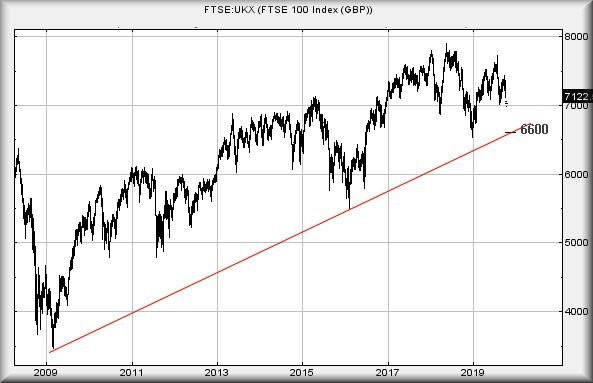How low can the FTSE 100 go after new crash?
After yesterday's heavy losses, our analyst consults the charts for hints at future direction.
3rd October 2019 09:12
by Alistair Strang from Trends and Targets
After yesterday's heavy losses, our analyst consults the charts for hints at future direction.

FTSE, an emergency report
'Pennyworth', an absurd TV '60's drama, remains "on point", their fictional English Queen asking how to remove the PM the same week it was reported the real Queen was doing the same.
Following the Brexit vote and Boris's leave campaign, the FTSE 100 index dropped by 550 points. Unlike 2nd October, that particular movement was quite artificial as the action happened in the opening seconds of the day with share prices lowered to provide attractive entry points.
This time, the FTSE feels like more relaxation's ahead. After all, the volatility was "only" 240 points and matched sessions in both February and December last year.
The immediate bottom line is of weakness below 7,119 suggesting coming travel down to an initial 7,053 points. If broken, secondary is at 7,027 points and a level where the index almost must rebound.
If chasing a bounce from this target level, the tightest stop calculates at 6,982 points, so ensure clean underwear is available!
There's a very real problem if 6,982 breaks. The market will achieve a series of "lower lows" and stumble into territory with a, hopefully, ultimate bottom intention at 6,730 points.
We can, of course, calculate lower but have considerable trouble reaching below 6,600 points. Just for a giggle, we drew the uptrend since the market crash of 2009 and guess what, it intersects with the 6,600 ambition anytime soon. Hopefully this shall just prove coincidence.
The index closed the session at 7,122 points, needing above 7,154 to hint a rise may prove real.
In such an event, our initial target is at 7,194 points with secondary, if bettered, a more useful sounding 7,238 points.

Source: TradingView Past performance is not a guide to future performance
Alistair Strang has led high-profile and "top secret" software projects since the late 1970s and won the original John Logie Baird Award for inventors and innovators. After the financial crash, he wanted to know "how it worked" with a view to mimicking existing trading formulas and predicting what was coming next. His results speak for themselves as he continually refines the methodology.
Alistair Strang is a freelance contributor and not a direct employee of Interactive Investor. All correspondence is with Alistair Strang, who for these purposes is deemed a third-party supplier. Buying, selling and investing in shares is not without risk. Market and company movement will affect your performance and you may get back less than you invest. Neither Alistair Strang, or interactive investor will be responsible for any losses that may be incurred as a result of following a trading idea.
Alistair Strang has led high-profile and "top secret" software projects since the late 1970s and won the original John Logie Baird Award for inventors and innovators. After the financial crash, he wanted to know "how it worked" with a view to mimicking existing trading formulas and predicting what was coming next. His results speak for themselves as he continually refines the methodology.
Alistair Strang is a freelance contributor and not a direct employee of Interactive Investor. All correspondence is with Alistair Strang, who for these purposes is deemed a third-party supplier. Buying, selling and investing in shares is not without risk. Market and company movement will affect your performance and you may get back less than you invest. Neither Alistair Strang or Interactive Investor will be responsible for any losses that may be incurred as a result of following a trading idea.
These articles are provided for information purposes only. Occasionally, an opinion about whether to buy or sell a specific investment may be provided by third parties. The content is not intended to be a personal recommendation to buy or sell any financial instrument or product, or to adopt any investment strategy as it is not provided based on an assessment of your investing knowledge and experience, your financial situation or your investment objectives. The value of your investments, and the income derived from them, may go down as well as up. You may not get back all the money that you invest. The investments referred to in this article may not be suitable for all investors, and if in doubt, an investor should seek advice from a qualified investment adviser.
Full performance can be found on the company or index summary page on the interactive investor website. Simply click on the company's or index name highlighted in the article.